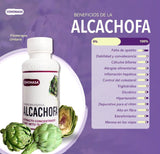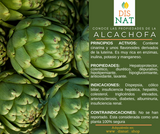Artichoke
Part used: The leaves, the stem, the flower heads and the root.
Active ingredients: Contains cinnarin and flavonoids derived from lutein. It is very rich in enzymes, inulin, potassium and manganese.
Properties: Hepatoprotective, choleretic, diuretic, depurative, lipid lowering, hypoglycemic, antioxidant, laxative.
Mechanisms of action: It exerts a protective effect on the digestive system, in particular on the liver, stimulating the secretion of bile (a compound secreted by the liver that is stored in the gallbladder and helps digest fat) and promoting the elimination of toxins and the purification of the organism because it stimulates the kidney to produce urine; its assets act as antioxidants, blocking substances responsible for cellular aging and free radicals. It helps regulate intestinal transit, contributing to the better absorption of calcium, to the stimulation of the natural defenses of the intestinal flora, to the reduction of cholesterol and blood sugar levels, making artichoke a highly recommended food. in the diet of patients with diabetes.
Indications: Dyspepsia, biliary colic, liver failure, hepatitis, cholesterol, high triglycerides, arteriosclerosis, diabetes, albuminuria, kidney failure.
Contraindications: have not been reported. It is considered a 100% safe plant.













